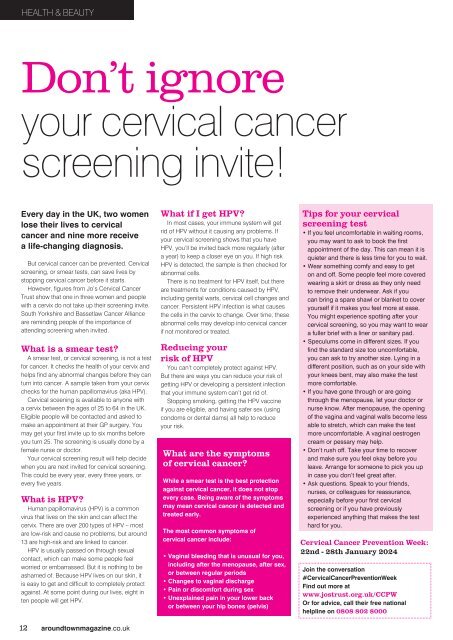Aroundtown Magazine January/February 2024 edition
Read the New Year edition of Aroundtown Magazine, South Yorkshire's premier free lifestyle magazine for Rotherham, Barnsley and Sheffield.
Read the New Year edition of Aroundtown Magazine, South Yorkshire's premier free lifestyle magazine for Rotherham, Barnsley and Sheffield.
You also want an ePaper? Increase the reach of your titles
YUMPU automatically turns print PDFs into web optimized ePapers that Google loves.
HEALTH & BEAUTY<br />
Don’t ignore<br />
your cervical cancer<br />
screening invite!<br />
Every day in the UK, two women<br />
lose their lives to cervical<br />
cancer and nine more receive<br />
a life-changing diagnosis.<br />
But cervical cancer can be prevented. Cervical<br />
screening, or smear tests, can save lives by<br />
stopping cervical cancer before it starts.<br />
However, figures from Jo’s Cervical Cancer<br />
Trust show that one in three women and people<br />
with a cervix do not take up their screening invite.<br />
South Yorkshire and Bassetlaw Cancer Alliance<br />
are reminding people of the importance of<br />
attending screening when invited.<br />
What is a smear test?<br />
A smear test, or cervical screening, is not a test<br />
for cancer. It checks the health of your cervix and<br />
helps find any abnormal changes before they can<br />
turn into cancer. A sample taken from your cervix<br />
checks for the human papillomavirus (aka HPV).<br />
Cervical sceening is available to anyone with<br />
a cervix between the ages of 25 to 64 in the UK.<br />
Eligible people will be contacted and asked to<br />
make an appointment at their GP surgery. You<br />
may get your first invite up to six months before<br />
you turn 25. The screening is usually done by a<br />
female nurse or doctor.<br />
Your cervical screening result will help decide<br />
when you are next invited for cervical screening.<br />
This could be every year, every three years, or<br />
every five years.<br />
What is HPV?<br />
Human papillomavirus (HPV) is a common<br />
virus that lives on the skin and can affect the<br />
cervix. There are over 200 types of HPV – most<br />
are low-risk and cause no problems, but around<br />
13 are high-risk and are linked to cancer.<br />
HPV is usually passed on through sexual<br />
contact, which can make some people feel<br />
worried or embarrassed. But it is nothing to be<br />
ashamed of. Because HPV lives on our skin, it<br />
is easy to get and difficult to completely protect<br />
against. At some point during our lives, eight in<br />
ten people will get HPV.<br />
12 aroundtownmagazine.co.uk<br />
What if I get HPV?<br />
In most cases, your immune system will get<br />
rid of HPV without it causing any problems. If<br />
your cervical screening shows that you have<br />
HPV, you’ll be invited back more regularly (after<br />
a year) to keep a closer eye on you. If high risk<br />
HPV is detected, the sample is then checked for<br />
abnormal cells.<br />
There is no treatment for HPV itself, but there<br />
are treatments for conditions caused by HPV,<br />
including genital warts, cervical cell changes and<br />
cancer. Persistent HPV infection is what causes<br />
the cells in the cervix to change. Over time, these<br />
abnormal cells may develop into cervical cancer<br />
if not monitored or treated.<br />
Reducing your<br />
risk of HPV<br />
You can’t completely protect against HPV.<br />
But there are ways you can reduce your risk of<br />
getting HPV or developing a persistent infection<br />
that your immune system can’t get rid of.<br />
Stopping smoking, getting the HPV vaccine<br />
if you are eligible, and having safer sex (using<br />
condoms or dental dams) all help to reduce<br />
your risk.<br />
What are the symptoms<br />
of cervical cancer?<br />
While a smear test is the best protection<br />
against cervical cancer, it does not stop<br />
every case. Being aware of the symptoms<br />
may mean cervical cancer is detected and<br />
treated early.<br />
The most common symptoms of<br />
cervical cancer include:<br />
• Vaginal bleeding that is unusual for you,<br />
including after the menopause, after sex,<br />
or between regular periods<br />
• Changes to vaginal discharge<br />
• Pain or discomfort during sex<br />
• Unexplained pain in your lower back<br />
or between your hip bones (pelvis)<br />
Tips for your cervical<br />
screening test<br />
• If you feel uncomfortable in waiting rooms,<br />
you may want to ask to book the first<br />
appointment of the day. This can mean it is<br />
quieter and there is less time for you to wait.<br />
• Wear something comfy and easy to get<br />
on and off. Some people feel more covered<br />
wearing a skirt or dress as they only need<br />
to remove their underwear. Ask if you<br />
can bring a spare shawl or blanket to cover<br />
yourself if it makes you feel more at ease.<br />
You might experience spotting after your<br />
cervical screening, so you may want to wear<br />
a fuller brief with a liner or sanitary pad.<br />
• Speculums come in different sizes. If you<br />
find the standard size too uncomfortable,<br />
you can ask to try another size. Lying in a<br />
different position, such as on your side with<br />
your knees bent, may also make the test<br />
more comfortable.<br />
• If you have gone through or are going<br />
through the menopause, let your doctor or<br />
nurse know. After menopause, the opening<br />
of the vagina and vaginal walls become less<br />
able to stretch, which can make the test<br />
more uncomfortable. A vaginal oestrogen<br />
cream or pessary may help.<br />
• Don’t rush off. Take your time to recover<br />
and make sure you feel okay before you<br />
leave. Arrange for someone to pick you up<br />
in case you don’t feel great after.<br />
• Ask questions. Speak to your friends,<br />
nurses, or colleagues for reassurance,<br />
especially before your first cervical<br />
screening or if you have previously<br />
experienced anything that makes the test<br />
hard for you.<br />
Cervical Cancer Prevention Week:<br />
22nd - 28th <strong>January</strong> <strong>2024</strong><br />
Join the conversation<br />
#CervicalCancerPreventionWeek<br />
Find out more at<br />
www.jostrust.org.uk/CCPW<br />
Or for advice, call their free national<br />
helpline on 0808 802 8000
















